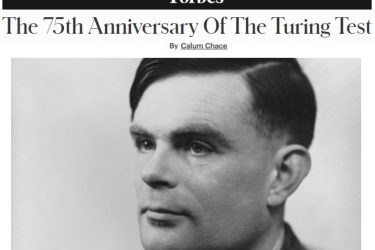It was keenly awaited by people interested in the possible near-term arrival of super-intelligence, but Transcendence has opened to half-empty cinemas and terrible reviews – at the time of writing it has a 20% “fresh” rating on Rotten Tomatoes.
The distributors kept changing the release date, which might indicate they realised the film wouldn’t open with a splash, but that they hope it could grow to become a cult classic. Sadly, I doubt it. Sadly, because in some ways Transcendence is a fine film with great ambitions. For me it is one of the best science fiction films of recent years. But it is severely flawed.
Before I start, there are spoilers ahead. And a declaration of interest: by sheer coincidence, Transcendence shares some key plot points with my novel, Pandora’s Brain.
The Good stuff
The film looks great. You can see the money on the screen. You would expect no less when the director is a hugely talented and experienced cinematographer like Wally Pfister.
More importantly, the film asks fascinating and vital questions: Will an artificial super-intelligence be created soon, and if so, will we like it? To its credit, it makes a serious and honest attempt to explore some of the possible answers. In a powerful opening scene, Johnny Depp declares that an artificial brain will soon be built whose “[cognitive] power will be greater than the collective intelligence of every person born in the history of the world.” Asked by an appalled audience member, “So you want to make a god? Your god?”, he replies candidly, “Isn’t that what humans have always done?”
Many futurists seem to have misunderstood this, viewing the movie as yet another Hollywood essay against technology. One reviewer says it is a quasi-cerebral film about a man who wants to rule the world: “control technology or it will control you” Like many reviews, this completely misses the point.
Transcendence is much more nuanced than that. It isn’t simply good guys and bad guys slugging it out. Some of the scientists believe that the super-intelligence they have created remains under the control of a good man, and they observe it accomplishing marvels with nanotechnology. Others – equally well-intentioned – fear the super-intelligence will lose its empathy for humans, and will come to regard us as obsolete. One of the scientists changes sides and asks whether the AI is still the man who was uploaded into the computer in the first place. He gets a sensible answer from one of his new allies: the AI has grown so far beyond the human that it doesn’t matter any more.
OK, so the film plays technological hopscotch in places. The idea that a mind could be uploaded by capturing data with a handful of electrodes placed on the skull is daft. But this is science fiction: you’re allowed a few bits of technological legerdemain to get the story rolling.
The bad stuff
The trouble is that the story never really does get rolling. We never really care about the outcome. There are several reasons for this.
One is Pfister’s curious decision to give the ending away by setting the whole film as a flashback from a technological wasteland where the internet has been destroyed.
Secondly, the film’s pace is oddly slow. That needn’t be a problem in itself – witness “Her”, the year’s other intriguing film about super-intelligence. But there is a lack of dramatic tension in the movie, a lack of urgency. At times it almost seems like a terribly reasonable debate – on the one hand this, but on the other hand that.
But the biggest problem lies with the characters. Johnny Depp seems pretty bored throughout, and despite Rebecca Hall’s best efforts, the relationship with his wife Evelyn is never compelling. Several other excellent actors (Cillian Murphy and Kate Mara in particular) are criminally one-dimensional. Is this what happens when a cinematographer becomes a director? The tragedy of the film is that you don’t feel awed by the super-intelligence’s wondrous achievements – nor do you feel the fear of its opponents
The film also has some vices which really should have been avoided. In a throwback to what should be a bygone age when women simply decorated films and screamed a lot, the leading woman, a brilliant scientist, is suddenly and unreasonably freaked out by the amount of knowledge the super-intelligence has about her. She is then, feeble-mindedly, reconciled when it finds a way to take human form. And surely to goodness Hollywood should by now have found less hackneyed ways to kill off powerful aliens and super-intelligences than infecting them with a virus.
The film closes with an ambiguous ending straight out of the Chris Nolan Inception playbook. The image of the falling drips is so beautiful that you can forgive Pfister for using it twice.
At the other end of the film it was interesting to see Elon Musk in one of the opening scenes – very appropriate given the recent announcement of his sizeable investment in AI firm Vicarious.
~
Transcendence is a brave and ambitious film which tries to get its audience to consider some important questions. Failures in its execution means it is unlikely to succeed. Tragically, it could even end up being counter-productive.



